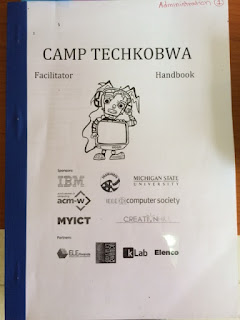A highlight of camp TechKobwa again this year was the 3.5 days
in Training of the Teachers (ToT) from August 4 - 7. With
TechKobwa, we hope to interest girls in technology studies and build their
self-confidence, but we also want to have farther reaching impact for building
capacity. Therefore each participating
school sends six girls but also the ICT teacher. We hope to create a critical mass within participating schools that will have sustained impact beyond the few girls who come to camp.
The teachers arrive several days earlier than the girls and undergo
intense training, learning methods for teaching ICT and self-confidence. In three days the teachers take all the
modules the girls will take during their five day camp in addition to learning
other topics applicable espe to ICT teachers, such as how to maintain a computer
lab. The ICT teachers teach many modules
to the girls, though they may have only learned the material a few days before
teaching the subject. This gives teachers
the opportunity to learn new material and techniques and practice these
techniques with a mentor present.
Our training included teachers from 10 schools across
Rwanda, 5 mentors from Creation Hill Rwanda, 4 Peace Corps volunteers, 3 people
from Michigan State University, a person from Peak Research and one from
IBM. Ice breakers and team-building
activities help get such a diverse group comfortable working together as a
cohesive team.
So, Rusty from the Peace
Corps, led the group through several effective exercises, using a rope as the
common thread for each. We jumped rope in teams of two or more.
We saw how teamwork helped us defy gravity, provided our
team member trusted in the support of the other team members.
And, we saw how our collection of talents created a strong
network that allowed us to raise others with ease, surprising ourselves at the
strength we exhibited as a team.
Blair and Rodney used Elenco’s Snap Circuits kits to teach
basic electronic concepts.
Laurie taught many Computer Science Unplugged sessions,
providing the teachers with material they can teach without needing computers
or electricity. Teachers learned
interesting and fun ways to teach binary math, algorithms, and various sort
algorithms.
Here’s an example of an aid which can be used to teach
binary math. Prince and Theogene took
turns explaining the topic to the other teachers.
Below the teachers are practicing a human version of a
parallel network sort algorithm. They
began the exercise a bit skeptical but felt very surprised and triumphant when
they saw the algorithm actually worked.
Teachers also learned programming in Scratch, a visual
programming language designed to teach young people basic coding constructs by
letting students easily write programs with immediate visual feedback based
upon making “sprites” (animated characters) perform various actions.
I reviewed basic internet skills and taught a session on
internet safety. I also introduced the “Mission
Innovation” project and familiarized the teachers with their role throughout
the week, mentoring the girls on their research projects. Sorry, there are no pictures but I couldn't act
as roving photographer while I taught. (We do have pictures with the girls, however.)
Elisabeth and I also took the teachers through the “Life
Skills” modules the students would take.
These modules strive to build skills that raise self-confidence. We covered topics such as self-confidence, “Finding
Your Voice,” written and oral communication, and goal-setting. Teachers learned the importance of
incorporating these topics and also techniques for helping build girls’
self-confidence and problem solving skills.
 Elisabeth and KOICA volunteers introduced teachers to a program that teaches them touch typing.
Elisabeth and KOICA volunteers introduced teachers to a program that teaches them touch typing.
For teachers with no computers or projection equipment, Elisabeth showed them how they could create mock ups of a keyboard and common applications on rice sacks. The mock ups allow the teachers to introduce concepts of browsers and the internet.
 Elisabeth and KOICA volunteers introduced teachers to a program that teaches them touch typing.
Elisabeth and KOICA volunteers introduced teachers to a program that teaches them touch typing.For teachers with no computers or projection equipment, Elisabeth showed them how they could create mock ups of a keyboard and common applications on rice sacks. The mock ups allow the teachers to introduce concepts of browsers and the internet.
Though it made for an extremely packed schedule, the ToT resulted in several teachers either teaching the material to the campers or providing translation from English to Kinyarwanda.




















